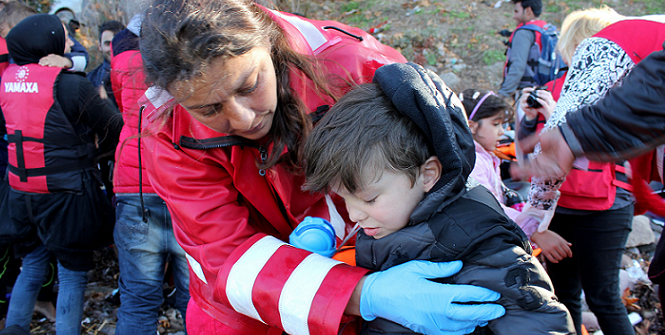The Humanitarian Imperative to Assist Migrants

In light of the 32nd International Conference of the Red Cross and Red Crescent from 8-10 December 2015, the Australian Government and Australian Red Cross have pledged to work together to protect the safety and dignity of migrants in Australia and across the Asia-Pacific region.
Government representatives present at the conference made joint pledges with their country’s Red Cross or Red Crescent societies to address key humanitarian issues.
Unsurprisingly, the hardships faced by refugees, asylum seekers and other vulnerable migrants were a key topic of discussion among the 190 states present. During the conference, Red Cross and Red Crescent leaders called on governments to do more to protect the dignity and safety of all migrants and ensure their access to essential services.
Elhadj As Sy, the Secretary General of the International Federation of Red Cross and Red Crescent Societies (IFRC), said ‘All people, regardless of status, have a right to live with safety and dignity. We need to do more – governments and the humanitarian community together – to meet these needs’.
The Australian Government and Australian Red Cross made nine pledges at the conference, three of which concerned migration.
The first pledge will provide Australian Red Cross with continued access to all people in immigration detention in Australia, for the provision of appropriate humanitarian support. This includes monitoring of conditions and treatment, as well as re-establishing contact between family members who have been separated.
Australian Red Cross will maintain regular dialogue with government on issues of humanitarian concern rising from detention monitoring and offer advice on formulating policies and procedures on people held in immigration detention.
‘This is not a choice for Red Cross, but a humanitarian necessity,’ explains Vicki Mau, National Manager of Migration Support Programs at Australian Red Cross.
‘At a time where public opinion is divided and the issue of migration such an area of debate, we refer to our Fundamental Principles as our guide. Regardless of who you are, where you come from or how you arrived in Australia, Red Cross provides assistance to those who are most vulnerable,’ she said.
A second pledge focussed on preventing and responding to human trafficking, slavery and slavery-like practices such as forced marriage and forced labour. Red Cross and the Australian Government will work together to understand the extent and nature of these issues and identify gaps in prevention strategies and responses. This includes ongoing participation in forums with business, civil society, unions and academia.
A third and more wide-ranging pledge involved the Australian Government and Red Cross working together on safeguards to protect the dignity and safety of migrants in the Asia-Pacific region. This would build on existing opportunities for regional cooperation, including with States, regional and non-government organisations and civil society.
Elhadj As Sy from IFRC says that ‘The Red Cross and Red Crescent is present in all countries along migration routes. We are able to support people at all points of their journeys,’ said Elhadj As Sy from IFRC. ‘We call again on our government partners to help facilitate this role, and to strive to put the needs and rights of vulnerable people on the move at the centre’.
Australian Red Cross and its counterparts worked hard to profile migration issues at the conference. Vicki Mau believes that Australia’s pledges on migration speak to the origins and core purpose of the Red Cross Red Crescent Movement.
Vicki Mau continues by saying, ‘Established in war and operational in all the world’s natural and human-made disasters and emergencies, our Movement assists in times of crisis and dire humanitarian need. Nowhere is this clearer at the moment than in the vulnerabilities of people on the move in search of safety.
‘We must work together with governments to respond to the practical and humanitarian challenges that migration presents, from aid to humanitarian diplomacy, using our networks, our expertise, our communities and volunteers’.
This article is a part of an ongoing series by the Australian Red Cross. It may be republished under a Creative Commons License. Learn more about the International Conference here.


